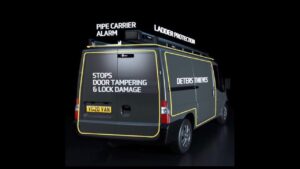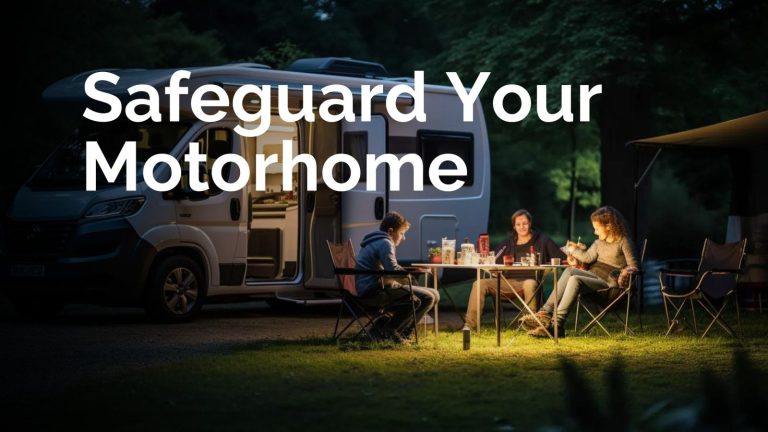

Owning a motorhome offers a sense of freedom and adventure, allowing you to explore without the constraints of traditional accommodation. However, it’s essential to ensure your mobile abode is secure. The primary focus of this section is to understand the significance of motorhome security and the need for a motorhome alarm system.
A motorhome is not just a vehicle; it’s often a home away from home, containing valuable possessions and personal items. Consequently, it’s imperative to safeguard your motorhome from potential threats. This is where the role of a motorhome alarm system becomes paramount.
An effective motorhome alarm system acts as a deterrent, reducing the likelihood of theft or vandalism. It provides an immediate alert in case of unauthorised access or movement, allowing for quick response and action. These systems are designed to offer peace of mind, knowing that your motorhome is secured, whether you’re inside sleeping or out exploring. For more information on the various types of motorhome alarm systems, consider reading our article on motorhome security alarm.
Motorhomes, like any other vehicles, are susceptible to a range of security threats. Some of the most common risks include:
| Threat | Potential Impact |
|---|---|
| Theft of Motorhome | Loss of vehicle, valuables |
| Break-ins | Loss of personal belongings, damage to interior |
| Vandalism | Damage to exterior, potential interior damage |
An effective motorhome alarm system can significantly mitigate these risks, providing an essential layer of protection. It’s crucial to consider these threats when evaluating the need for a motorhome alarm system. A comprehensive security approach, including a reliable wireless motorhome alarm, can help ensure that your motorhome adventures are not marred by security concerns.
To effectively safeguard your motorhome, understanding the workings and types of motorhome alarm systems is key. This knowledge will aid you in choosing the best-suited alarm system to ensure the security of your vehicle.
Motorhome alarm systems are designed to detect potential threats to your vehicle and alert you or designated security agencies. The system is typically triggered by specific actions such as forced entry, motion within the vehicle, or attempts to start the vehicle without proper authentication.
Once activated, the alarm system emits a loud sound to deter intruders and alert nearby individuals. Some sophisticated systems also send alerts to your smartphone or directly to a security monitoring service.
The alarm system is usually controlled using a key fob or through a smartphone app, allowing you to arm and disarm the system conveniently. It’s important to ensure that your motorhome alarm system is armed whenever the vehicle is unattended.
There are various types of motorhome alarm systems available, catering to different needs and budgets. The two main types are wired alarm systems and wireless alarm systems.
Wired alarm systems are typically installed by professionals and are connected to the vehicle’s electrical system. They are known for their reliability but require a more complex installation process.
| Wired Alarm System | Description |
|---|---|
| Reliability | High |
| Installation | Professional |
| Cost | Higher end |
On the other hand, wireless alarm systems are easier to install and can often be done by the vehicle owner. They operate using batteries and communicate through radio signals. This type of alarm system is flexible and can be expanded to include additional security devices such as extra sensors or sirens.
| Wireless Alarm System | Description |
|---|---|
| Reliability | Depends on the signal strength |
| Installation | DIY |
| Cost | More affordable |
The choice between a wired and a wireless motorhome alarm will depend on your specific needs, budget, and the level of security you desire. Regardless of the type, a well-functioning motorhome alarm system is a crucial component of your overall motorhome security strategy.
By understanding how alarm systems work and the different types available, you will be better equipped to make an informed decision that ensures the security of your motorhome.
When it comes to ensuring the security of your motorhome, investing in a robust motorhome alarm system is a must. But not all alarm systems are created equal. To make an informed decision, it’s important to understand the essential features that a reliable alarm system should possess, as well as additional security features worth considering.
For more details on each of these features, check out our article on motorhome security alarm.
Consider these features based on your specific needs, the level of security desired, and your budget. Remember, the goal is to create a safe and secure environment for your motorhome.
By understanding the key features of a reliable motorhome alarm system, you’ll be better equipped to choose a system that provides the level of protection you need.
Once you have selected the right alarm system for your motorhome, the next step is the installation process. This stage is critical as the effectiveness of your motorhome alarm system largely depends on how well it is installed.
For the installation of a motorhome alarm system, you have two options: professional installation or do-it-yourself (DIY) installation.
Professional installation is performed by trained experts who have in-depth knowledge of alarm systems and their installation procedures. They will ensure that the alarm system is properly installed and functioning as intended. While this option may be more expensive, professional installation can provide peace of mind and save time.
On the other hand, DIY installation can be a cost-effective alternative if you have the necessary skills and tools. Many alarm systems come with detailed installation guides that can assist you in the process. However, it’s important to remember that incorrect installation can potentially hinder the performance of the alarm system or void its warranty.
| Installation Method | Pros | Cons |
|---|---|---|
| Professional | Expert installation, Saves time, Guaranteed performance | More expensive |
| DIY | Cost-effective, Flexible schedule | Requires technical skills, Time-consuming |
Though the specific installation process may vary based on the type of alarm system, here are some general steps that are typically involved:
Remember, whether you choose to undertake the installation yourself or hire a professional, ensure that the chosen alarm system is compatible with your motorhome. For more information on different types of alarm systems, refer to our articles on motorhome security alarm and wireless motorhome alarm.
Maintaining the motorhome alarm system is as crucial as its installation. Regular system checks and troubleshooting common issues are key to ensuring your alarm system remains efficient and effective.
Regular system checks help identify any potential issues before they escalate into major problems. These checks include inspecting the physical components of the alarm system, such as the sensors and the control panel, to ensure they are in good working condition.
A thorough check often involves:
Regular checks not only guarantee your system’s functionality but also extend its lifespan. For more detailed information about the checks you should conduct, visit our motorhome security alarm article.
Despite regular checks, you may encounter some common issues with your motorhome alarm system. Here are a few problems and their potential fixes:
It’s important to resolve these issues promptly to ensure your motorhome remains secure. If you’re unable to fix an issue, consider seeking professional help.
By maintaining your motorhome alarm system, you’re not just ensuring the system’s longevity but also reinforcing the security of your motorhome. Regular checks and timely troubleshooting are pivotal in preserving an effective and reliable alarm system.
In addition to installing a robust motorhome alarm system, there are several practical steps motorhome owners can take to maximise the security of their vehicles. These measures include safe parking practices, regular maintenance and updates, and the use of alarm systems alongside other security measures.
Choosing a safe and secure parking spot for your motorhome can significantly enhance its security. Always opt for well-lit areas and avoid isolated or secluded places. Whenever possible, park in areas with CCTV surveillance or in recognised motorhome parking areas. It’s a good practice to rotate your parking spots if you’re staying in one place for extended periods to avoid predictability.
Maintaining the operational efficiency of your motorhome alarm system is crucial for ensuring its effectiveness. Regular checks and updates can help identify and resolve any potential issues before they escalate. This includes checking the battery life, testing the alarm’s sound and response, and updating the system software if necessary. Regular maintenance not only ensures the longevity of the system but also helps to maintain the highest level of security for your motorhome.
While a motorhome alarm system plays a crucial role in vehicle security, it should not be the sole protective measure. Consider incorporating additional security devices and practices. These can include steering wheel locks, wheel clamps, GPS trackers, and immobilisers.
For instance, a wireless motorhome alarm can work in conjunction with a GPS tracker. While the alarm system alerts you of a potential intrusion, the GPS tracker can help track the vehicle’s location in case of theft.
Remember, the more layers of security you have, the harder it is for a thief to breach them. Also, clearly visible security measures may act as a deterrent, discouraging potential thieves from attempting to steal your motorhome.

Michael Horsfall, a seasoned plumbing and heating engineer with over 35 years of trade experience, is the innovative mind behind VanGuardian, a proactive van security solution. His journey into the realm of security was triggered by recurrent incidents of theft, particularly copper pipe theft right from outside his residence in Leeds. The rampant van crimes led him to envision VanGuardian, a patented alarm system engineered to deter theft by activating upon contact, safeguarding assets before any damage occurs. Michael's in-depth understanding of the challenges faced by tradesmen, paired with his endeavor on Dragons' Den to secure investment, underscores his commitment to fostering van safety. His profound expertise and real-world experience equip him with a distinctive insight, making his blogs an invaluable resource for individuals seeking pragmatic advice on van safety and security.

Copyright © 2021 VANGUARDIAN
VANGUARDIAN is a registered trademark of PROTEK-ONE, company no. 11802780.
